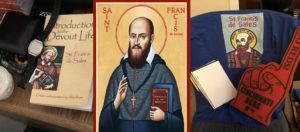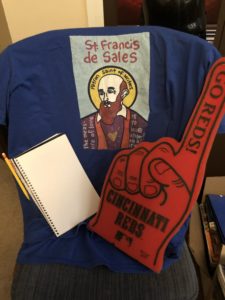Welcome to the cKotch.Com blog. I’m Christopher Kotcher, and this is Life and Times. Time to share some life lessons and experiences which guide my writing.

Confirming a Name
Confirmation is an important rite of passage for us Catholics. In this sacrament, we believe we gain wisdom and gifts from the Holy Spirit.
One major part of this tradition is selecting a Confirmation Name. The name links us to a patron saint, a heavenly companion, someone to help model our lives with a mind for eternity.
I chose the name Francis.
Most may think I chose this name for Francis of Assisi, the most popular Catholic Francis next to the pope. The guy’s even the patron saint of animals, and I’m a dog lover.
However, I chose the name for a different Francis. I’ve always wanted to be a writer, so I Googled “Patron Saint of Writers.” I found St. Francis de Sales.
Over the years, I’ve looked more and more into my patron saint. He’s become quite the guide for me. I’ve been wanting to write about him here, and now seems the perfect time.
Today is St. Francis de Sales’ feast day. This is the day Catholics set aside to honor him. Maybe my patron could even become a guide to you in some way.
A Dedicated Soul
I didn’t know much about St. Francis de Sales when I picked him as my patron. I simply wanted a heavenly guide for my writing.
At first, I only knew a few vague details about Francis from his Wikipedia page. Then I moved onto a few videos, book introductions, and online articles.
Here I would like to share some scenes which have proven particularly powerful for me.
Growing Up
Francis was born to a powerful family in the historical country of Savoy, now mostly part of France. His parents prepared him for a proper life as a nobleman, and he succeeded in all regards.
However, this wasn’t the kind of life Francis wanted. He wanted to be a priest.
These conflicting interests didn’t lead to many outbursts, arguments, or rebellious streaks. Francis worked to honor his parents’ wishes even as he followed his calling.
Yes, Francis would get that law degree his father wanted for him, but he also got a theology degree.
Yes, Francis became a skilled horseback rider, but he would also find a sign supporting his calling during one fateful ride. During a fall from his steed, Francis’ sword would fall upon another sword and make the shape of a cross.
Francis aimed to appease his father in following his calling. The aspiring priest sought the help of Bishop Claude de Granier of Geneva.
Granier arranged a deal. Francis would sign his rights of family succession to his younger brother and serve in Granier’s diocese.
Francis had found a way to both respect his family’s wishes and follow his own dream.
Spreading the Word
Francis would eventually succeed Granier as the Bishop of Geneva. Unfortunately, the occasion was not an entirely pleasant one.
The Protestant Reformation had begun. Christianity was divided. Ties between religion and politics led to war and bloodshed. Geneva itself was largely controlled by Calvinist forces.
Francis couldn’t even seat himself in the traditional capital of his diocese. Geneva had closed its doors to its Catholic Bishop. Francis would need to stay in the nearby city of Annecy.
Still, Francis wanted to bring people back together.
He became famous for walking through his diocese and preaching to his people. He would walk every day until his feet bled.
Every night, he would write. He wrote countless letters, documents, and teachings to guide the people. These writings were famous for appealing to everyone in a time where most religious texts were written for clergy alone.
Every hour of Francis’ day was meant to serve humanity. Every word of his writing held this same purpose as well. His efforts made Geneva one of the most respected diocese of its day.
Quite Quotable

Funny thing, I chose the Patron Saint of Writing as my personal patron. I looked to St. Francis de Sales’ life for guidance, but years passed before I actually read his writing.
I started with his most famous work, Introduction to the Devout Life. It is a book of spiritual direction and moral guidance based on letters Francis had written to his cousin Madame Marie de Charmoisy.
Now, the Introduction covers many topics. So, I will give you only a small taste of some of its wisdom here.
We’re going to look at some quotes from Francis’ teachings on reputation and slander. Keep in mind the original text was written in French, and not all English translations of the quotes are exactly alike.
First, Francis discusses why even the humble should value their reputation:
“A good name is an esteem, not of some excellence, but only of a plain and ordinary uprightness and integrity of life, and humility does not prevent us from recognizing this in ourselves.”
Reputation begins with how we view ourselves. Any good name should stem from who we believe ourselves to be.
Humility is merely recognizing our limits in addition to recognizing our positive qualities. Therefore, even the humble are encouraged to welcome and develop their reputation. True humility never rejects our own goodness.
However, Francis indicates that reputation is not the most valuable thing in life:
“Reputation is but a sign-board to show where virtue lodges; virtue, then, should be preferred in every way.”
Reputation is a vehicle to do good. It is a way to build our social lives and forge genuine relationships and partnerships.
If maintaining one’s reputations requires doing evil, then one should prioritize doing good. One’s moral life, one’s soul, should be valued over one’s social life.
You shouldn’t sacrifice the core of your being to receive kind words from others.
You may need to sacrifice your own reputation to do good. You may need to give your social life in service of your moral live and the well-being of others.
Still, don’t think you should ever sabotage someone’s reputation unjustly:
“The slanderer, by a single stroke of his tongue ordinarily commits three murders: he kills his own soul and that of him who listens to him by a spiritual murder; and he takes the social life of him whom he defames.”
While one’s reputation is not the ultimate good, it is still a great good. This makes sabotaging someone’s social life a grave act, especially since the act often involves others in its evil.
These quotes were first published in 1609, over 400 years ago.

Plenty of Patronage
St. Francis de Sales has become a great guide for me.
I chose him because I wanted my Confirmation Name to reflect my desire to write.
I learned about his life and saw a model for my life.
As Francis always wanted to be a priest, I always wanted to be a writer.
I was bright in all subjects in school. People thought I could be a brilliant scientist, business man, or videogame developer. All I wanted to do was write.
As Francis looked for ways to fulfill his dream, I too looked for ways to fit writing into everyone’s expectations.
I became an English Major in college. I wanted to learn about the great literary canon I myself sought to enter. I added teaching certifications to satisfy concerns about having a future career.
Teaching became a second dream for me. Still, there were times it conflicted with my writing. College coursework and student teaching lesson plans often drowned me.
I looked for a Patron Saint for Teachers, someone to guide me there too. Imagine my surprise when Google once more gave me St. Francis de Sales.
Francis’ long nights of writing had made him a patron of writers. Preaching and teaching everyday until his feed bled made him a patron of educators as well.
I saw Francis in a whole new light. He wasn’t merely a guide for serving others with my writing. In fact, he became more than a guide for both my writing and my teaching.
St. Francis de Sales became a guide for putting my whole self into everything I do. He showed me that the various parts of my life I once considered separate could be combined into one gift.
I want to develop and spread wisdom, just as Francis did. In writing, in teaching, in everything. This will be the one goal which unifies all my pursuits.
And if that weren’t neat enough, I also discovered he’s the patron saint of my mom’s old hometown of Cincinnati, Ohio! This guy really does cover a lot!

Discussion Time!
St. Francis De Sales is one of my favorite role models from history. He is my personal example of everything a writer and a teacher should be.
What do you think of Francis? Are you able to see in him the things that I do?
Also, what role models do you value? These could either be people you personally know or historical figures. I know I’ve got a few people from my own life I may want to cover at some point. They just don’t have a feast day on January 24.
Kotcher’s Call to Action
If you like my content and wish to see more, you could check out my books Five Strange Stories and Good Stuff: 50 Poems from Youth on Amazon. They are enrolled in the Kindle Matchbook program, so anyone who buys the paperbacks can also get the eBooks for free.
Finally, be sure to like my Facebook page and share it with your friends. I post a link there whenever a new blog post goes live each Friday at 5:00 PM EST.